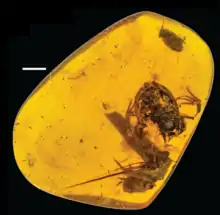| Electrorana Temporal range: Upper Cretaceous, | |
|---|---|
 | |
| Holotype in Burmese amber | |
| Scientific classification | |
| Domain: | Eukaryota |
| Kingdom: | Animalia |
| Phylum: | Chordata |
| Class: | Amphibia |
| Order: | Anura |
| Genus: | †Electrorana Xing et al., 2018 |
| Species: | †E. limoae |
| Binomial name | |
| †Electrorana limoae Xing et al., 2018 | |
Electrorana is an extinct genus of frog that lived in what is now Myanmar during the mid-Cretaceous, around 99 million years ago.[1] The type and only species is E. limoae.
Description

Electrorana was described on the basis of four different specimens found in Burmese amber, which show varying states of completeness. These specimens have a body length of 2 centimetres (0.79 in)[1] though it has been suggested that they are likely to have been juveniles.[2]
Taxonomy
Phylogenetic analysis suggests that Electrorana is a relatively basal frog that lies outside of Neobatrachia, with unclear relationships to living basal frog clades.[1][3] A close relationship with the extinct frog Aerugoamnis from the Eocene of North America has been found in some phylogenies.[1][3]
Ecology
Electrorana is thought to have lived in a tropical rainforest, making it one of the oldest known frogs to have inhabited such an environment.[1]
References
- 1 2 3 4 5 Xing, L.; Stanley, E. L.; Bai, M.; Blackburn, D. C. (2018). "The earliest direct evidence of frogs in wet tropical forests from Cretaceous Burmese amber". Scientific Reports. 8: Article number: 8770. doi:10.1038/s41598-018-26848-w. PMC 6002357. PMID 29904068.
- ↑ Roček, Zbyněk; Dong, Liping; Wang, Yuan (2023-04-27). "The Early Cretaceous frog Genibatrachus from China: Osteology, development, and palaeogeographic relations". Palaeobiodiversity and Palaeoenvironments. doi:10.1007/s12549-023-00579-x. ISSN 1867-1594.
- 1 2 Zhang, Jing; Dong, Liping; Du, Baoxia; Li, Aijing; Lei, Xiangtong; Zhang, Mingzhen; Wang, Sen; Ma, Guorong; Hui, Jianguo (2023-01-01). "First fossil evidence for a new frog from the Early Cretaceous of the Jiuquan Basin, Gansu Province, north-western China". Journal of Systematic Palaeontology. 21 (1). doi:10.1080/14772019.2023.2183146. ISSN 1477-2019.